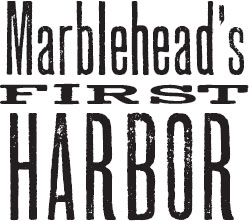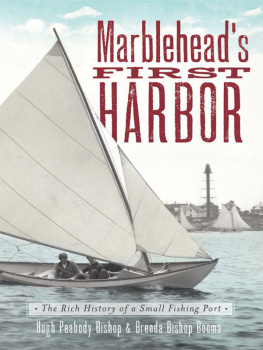

Published by The History Press
Charleston, SC 29403
www.historypress.net
Copyright 2011 by Brenda Bishop Booma and Hugh Peabody Bishop
All rights reserved
All images are from the authors collection unless otherwise noted.
Facing page: Gretchen Peabody Bishop and Robert Hugh Bishop.
A sailing dory designed and built by Will Chamberlain. Courtesy of Peach Collection
Cover design by Natasha Walsh.
First published 2011
Second printing 2012
e-book edition 2013
Manufactured in the United States
ISBN 978.1.62584.226.8
Booma, Brenda Bishop.
Marbleheads first harbor : the rich history of a small fishing port / Brenda Bishop Booma and Hugh Peabody Bishop.
p. cm.
Includes bibliographical references.
print edition ISBN 978-1-60949-497-1
1. Fishing ports--Massachusetts--Marblehead--History--20th century. 2. Fisheries--Massachusetts--Marblehead--History--20th century. 3. Harbors--Massachusetts--Marblehead--History--20th century. 4. Fishers--Massachusetts--Marblehead--Biography. 5. Marblehead (Mass.)--History--20th century. 6. Marblehead (Mass.)--Biography. I. Bishop, Hugh Peabody. II. Title.
SH222.M4B66 2011
725.34097445--dc23
2011042754
Notice: The information in this book is true and complete to the best of our knowledge. It is offered without guarantee on the part of the authors or The History Press. The authors and The History Press disclaim all liability in connection with the use of this book.
All rights reserved. No part of this book may be reproduced or transmitted in any form whatsoever without prior written permission from the publisher except in the case of brief quotations embodied in critical articles and reviews.

To our parents, whose effort on our behalf enabled us to live the lives we have
And all I ask is a merry yarn from a laughing fellow-rover,
And quiet sleep and a sweet dream when the long tricks over.
Contents
Acknowledgements
At a neighborhood Christmas party in 2008, I told Arlene Briggs Willard how well I remembered her father and how much I thought of him. She then related the story told in the book about how her father signed up for duty in World War I in April 1917. I decided that this type of Marblehead history, along with my varied experiences from a lifetime of commercial fishing, should be put in writing to pass on to my children. The stories started to grow, and I enlisted my sister Brendas help. She has never been one to give a halfhearted effort. The end result is this book, which involved much more time and effort than either of us anticipated.
Brenda and I would like to thank the offspring of the old-timers for their generous help. These Marbleheaders include Arlene Briggs Willard, Joyce Conner Thibodeau, Betty Cloutman, Virginia Bates Williams and Dave, Karen, Tom and Ted Peach.
Others who spurred us on with their interest in our project include Harriet Brown Bull, Suzanne Brown, Dave Hildreth, Jeff Tutein and Wayne Butler of the Marblehead Historical Commission.
There were many people with whom we held conversations, who came forward with a useful bit from their pasts and offered moral support. We appreciate their thoughtfulness and assistance.
Our good friend and one-time employee, Peter Schalck, has been exceedingly helpful with graphic design and computer support. Once our shipping manager at the Lobster Company, he now uses his considerable talents running his own company, Flat Rock Creative in Salem, Massachusetts.
Without the professionalism of The History Press, this book could not have come to fruition.
We would like to thank Hughs wife, Judy Bishop, who has earned unlimited appreciation from both of us for her effort, support and patience.

Ed Hawkes.
There are two people without whom the job never could have been accomplished. They are Ed and Jean Hawkes. They earned our special thanks and admiration. Ed is mentioned extensively in the book and is an extraordinary individual. He is a patriot, successful businessman and good family provider, a perfect example of the Greatest Generation. Now ninety-one years old, his stories, material and personal writing helped sustain and encourage us when even Brenda would get a little down. Without Ed and Jeans inquiries about, Hows the book coming? its possible a partly completed pile of paper would be gathering dust somewhere. Our thanks and love to both of them.
AERIAL VIEW OF LITTLE HARBOR
(originally called First Harbor)

1. Fishermans Beach
2. Hildreth/Percival House
3. Mollys Rocks
4. Gashouse Beach
5. Bates Boat Yard
6. Baays Yacht Yard
7. Burgess Airplane Factory
8. Hood Enterprises
9. Beachcomber Club
10. Barbers/Marblehead Lobster Company
11. Graves Float
12. Fishermen Shanties
13. Old Victorian House
14. Crowninshield House
MARBLEHEAD CHART

GULF OF MAINE CHART

CANYONS OF THE CONTINENTAL SHELF AND NANTUCKET SHOALS CHART

Prologue
In the 1600s, the early Marbleheaders followed the trail from the beach at First Harbor to their meetinghouse on Old Burial Hill. Their lives and deaths were resolved at this lookout, high above the Atlantic Ocean, but the heart and soul of their beings was intertwined with the sea. The growing season in New England being a short one, the ocean afforded the best opportunity for economic prosperity in those years.
Fishing became the trademark of the town. First Harbor was a refuge for the working folk, a safe haven for their vessels and a community of like-minded, independent Yankees. The Coves notoriety, however, is usually overshadowed by that of Marblehead Harbor, a major yacht anchorage on the East Coast of the United States, and by the town itself, with its claim of Birthplace of the American Navy. During the seventeenth century, Great Bay (the big harbor) was ancillary to First Harbor, the small inlet nestled between Fort Sewall and Peaches Point.
In the early days, Marblehead had more fishermen than Gloucester. The seventy-five years from the American Revolution to the middle of the nineteenth century were the golden age of fishing for the town. In 1809, there was a fleet of 116 fishing schooners that sailed to the Grand Banks twice a year between spring and fall. By 1879, however, there was only a solitary vessel representative of the great industry from which for more than two centuries, a vast majority of the men and boys of Marblehead had gained a livelihood.
Next page



















